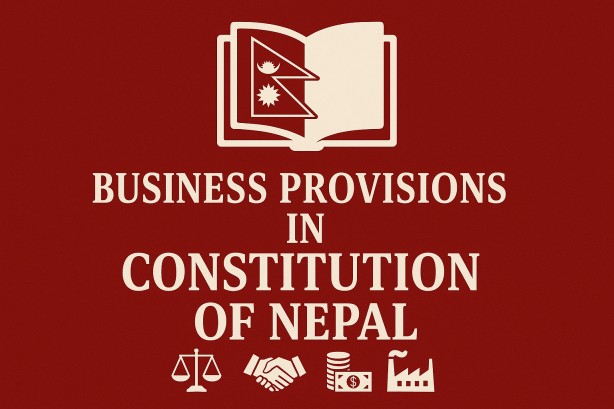Provision related to Business from Constitution of Nepal

The Constitution of Nepal is not only a political and legal document—it also lays the foundation for economic rights, business freedom, and fair market practices. From protecting the right to choose a profession to safeguarding consumer interests, it defines how businesses can operate in a just and competitive environment. For entrepreneurs, investors, and professionals, understanding these constitutional provisions is essential to navigate Nepal’s regulatory landscape and build sustainable enterprises. Some of them are:
Freedom to do business (Art. 17(2)(f))
What it means: You can choose your profession, start and run a company anywhere in Nepal. The State can still set reasonable conditions (licensing, health/safety rules) and may reserve certain industries by law.Equality before law / non-discrimination (Art. 18)
What it means: Regulators and courts must treat businesses and people equally under general laws (e.g., permits, taxes, access to services). Special protections for disadvantaged groups are allowed. ag.gov.npProperty rights incl. IP (Art. 25)
What it means: You can acquire, use, and earn income from property; “property” explicitly includes intellectual property (patents, trademarks, copyrights). Expropriation is only for public interest with compensation.Freedom of media/advertising (Art. 19)
What it means: No prior censorship of publications/broadcasts. Advertising and content still have to respect laws on decency, defamation, etc., and regulators can license/oversee media platforms.Right to Information (Art. 27)
What it means: Anyone can request information from public bodies. Handy for tenders, regulatory files, EIAs, tariffs, and compliance data—subject to lawful confidentiality exceptions.Right to Privacy (Art. 28)
What it means: Personal data, business records, and communications are protected. Companies need lawful bases and safeguards when collecting/processing customer or employee data.No forced labour/trafficking (Art. 29)
What it means: Absolute bar on forced or bonded labour and trafficking. Build supply-chain checks and HR policies that prevent coercion; violations trigger penalties and compensation.Child labour curb (Art. 39(4))
What it means: No employment of children in factories/mines or other hazardous work. Businesses must verify ages and keep tight contractor controls.Clean environment (Art. 30)
What it means: People have a right to a healthy environment and compensation for harms. Expect EIAs, emission/waste rules, and “polluter pays”-style liability exposure.Work & labour rights (Arts. 33–34)
What it means: Right to employment and choice of work; fair remuneration, social security; unionisation and collective bargaining. Align HR, wages/benefits, and dispute processes with federal labour law.Consumer rights (Art. 44)
What it means: Consumers are entitled to quality goods/services and compensation for harm. Keep warranties, recalls, QA, labeling, and complaint redressal in shape.Competition policy (Art. 51(d)(7)–(8))
What it means: State policy pushes competitive markets and cracking down on black-marketing, artificial scarcity, and monopolistic practices; also promotes domestic industry and local inputs. Expect pro-competition enforcement and procurement preferences.ADR encouraged (Art. 51(k)(2))
What it means: The Constitution directs the use of mediation and arbitration for general disputes. Put clear ADR clauses in contracts to speed up commercial dispute resolution.
Who regulates what (taxes, licensing, trade)
Division of powers (Art. 57 & Schedules 5–9)
What it means: Nepal is federal: some powers are federal, some provincial, some local, and some shared. Your business may interact with all three tiers depending on activity/location.Federal (Schedule 5)
What it means: The centre handles the central bank/monetary policy, customs, excise, VAT, corporate & personal income tax, and intellectual property. Cross-border trade and national standards sit here.State/Province (Schedule 6)
What it means: Provinces oversee intra-state trade, industry/industrialisation, certain taxes/fees, and state highways—so factory locations and many operating permits touch this layer.Local (Schedule 8)
What it means: Local governments levy local taxes/fees (e.g., wealth, house-rent, land/building registration, vehicle, business, tourism), manage local markets and issue various local approvals. Budget for these.Concurrent (Fed–State) (Schedule 7)
What it means: Contracts, partnerships, cooperatives, bankruptcy/insolvency, labour and industrial disputes, etc., can be legislated by both levels—your compliance stack must line up with the federal framework plus any provincial rules.
Fiscal & trade guardrails that affect businesses
“No taxation without law” (Federal Art. 115; State Art. 203; Local Art. 228)
What it means: Taxes/loans must rest on enacted laws. If a levy isn’t grounded in law, you can challenge it.Inter-state trade protection (Art. 236)
What it means: Provinces and local bodies shouldn’t obstruct or discriminate in trade across provincial lines—useful if you face uneven checkpoints or duplicative local charges.Revenue sharing & transfers (Art. 60(3)–(8))
What it means: A constitutional framework guides revenue distribution and equalisation across tiers, shaping sub-national budgets and, indirectly, local tax/fee pressure and infrastructure spend.
Public-sector integrity (helpful for tenders & SOEs)
CIAA (Arts. 238–239)
What it means: The Commission for the Investigation of Abuse of Authority can investigate public officials. When you bid or interact with agencies, there’s constitutional backing for anti-corruption oversight.Auditor General (Art. 241(1)–(2))
What it means: The Auditor General audits all government bodies and SOEs, including companies where the government holds a controlling stake—raising transparency standards in public procurement and SOE counterparties.
Enforcing these rights
Right to constitutional remedies (Art. 46)
What it means: If a fundamental right is breached (e.g., free profession, equality, privacy), you can seek writs/remedies in the Supreme Court/High Courts to enforce it.
The Constitution of Nepal ensures that business activities are rooted in fairness, accountability, and inclusiveness. It provides clear rights—like freedom to trade, protection of property, consumer safeguards, and labour rights—while also setting responsibilities to respect privacy, environment, and fair competition. For businesses, this means operating with both opportunity and accountability. By aligning with constitutional principles, companies can not only stay compliant but also contribute to Nepal’s long-term economic growth and social progress.